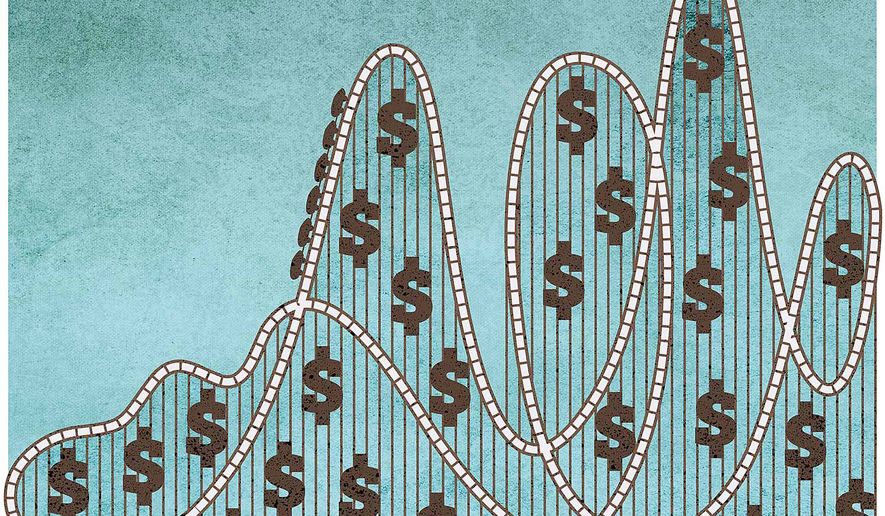OPINION:
Holiday parties are fun for economists when the stock market is up and calm — then we are regaled with stories of savvy picks and personal triumphs. When equities head south along the pattern of a rat seeking out of a maze, folks irritably ask — professor, what’s wrong?
My answer is not much.
Two facts should color assessments of the recent market correction: Stocks are undervalued and the outlook for the U.S. economy remains solid.
When stocks peaked in early October, the average price-earnings ratio — the price we pay for company profits — for the S&P 500 index — it captures about 80 percent of publicly traded enterprises — was 21. That was well below the quarter century moving average of 25.
Stocks are really inexpensive with average price-earnings ratio even lower as company earnings continue to rise.
The economy is decelerating. The nearly 4 percent growth accomplished during the second and third quarters is not sustainable, but the economy will continue to grow close to 3 percent and is creating more jobs than pessimists thought possible. Factoring in inflation at 2 percent, corporate profits should continue to rise in the high single digits and support increasing stock prices.
Still the market is in a cyclical funk for several reasons, but those are more like a kidney stone that will pass, albeit painfully, than a terminal illness.
Growth prospects abroad are not good and that has driven investors from equities across the globe into Treasuries, driving down stock prices and longer-term interest rates.
It is fashionable in left-leaning financial media to blame China’s slowing economy on President Trump’s trade war, but his tariffs have not had a lot of grip. Most of those are at 10 percent, and since April the yuan has dropped about that much to erase their pricing effects. For years, China has been in a credit bubble with state banks and a shadow lending system on steroids papering over fraudulent bookkeeping — now the bill is coming due.
Europe’s funk is not new. The European Union (EU) has no credible immigration policy or border defenses. About 1.6 percent of Germany’s population are recent refugees, mostly lacking language skills and capable of little more than loitering in railway stations and menial work.
Eurozone restrictions on deficit spending make it virtually impossible for Italy and France to restructure labor-market and business policies for the age of artificial intelligence, robotics and small tech startups. Sensing folly, the U.K. voted for Brexit but Prime Minister Theresa May has conspired with other EU leaders to indefinitely shackle her countrymen to the EU corpse.
It’s important to remember that the imminent drivers of growth and stock market value — artificial intelligence, robotics and small startups that create and exploit those technologies — can happen anywhere, and entrepreneurs will find homes in America, Southern and Eastern Asia and the U.K. if it manages to unshackle itself from moribund European statism.
In America, much of the Trump rally was powered by the FAANG stocks — Facebook, Apple, Amazon, Netflix and Google. Apple is approaching market saturation with iPhones and is in the painful process of developing new business lines to redeploy its substantial capital. Google, Amazon and Facebook face tough antitrust challenges.
Facebook and Google must address privacy and fake news issues and have employees in rebellion against their leadership. Netflix faces a host of new direct-over-the-Internet competitors flogging movies and original content.
Generally, the FAANGs have been more volatile in recent months and declined more than the market in general. The good news is that most of the rest of the market is a downright bargain with price-eaarnings significantly under 20.
The trade war with China has rattled CEOs and investors, but the one thing I know about major trade talks is that if national leaders believe markets will tank if they fail, they will likely find some kind of face-saving agreement to sign, declare victory and go home — and gullible Wall Street will break out into euphoria.
In the short run, the stock market is not the economy — if that were so, the recent market correction would imply unemployment at 7.3 percent not its current 3.7 percent. In the long run, the economy drives the stock market.
In the end, solid economic growth cannot be denied. That is likely where we are headed and then stock prices will recover.
• Peter Morici is an economist and business professor at the University of Maryland, and a national columnist.




Please read our comment policy before commenting.